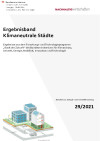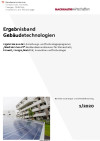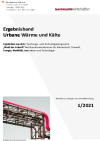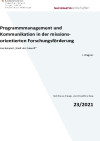Suchergebnisse
Ergebnisband „Klimaneutrale Städte"

Der vorliegende Ergebnisband stellt abgeschlossene Projekte aus dem Forschungs- und Technologieprogramm „Stadt der Zukunft“ des Bundesministeriums für Klimaschutz, Umwelt, Energie, Mobilität, Innovation und Technologie (BMK) im Bereich Klimaneutrale Städte vor. Die gewonnenen Erkenntnisse sollen eine Entwicklung in Richtung energieeffiziente und klimaverträgliche Stadt unterstützen, die auch dazu beiträgt, die Lebensqualität und die wirtschaftliche Standortattraktivität zu erhöhen.
Schriftenreihe
29/2021
Redaktionelle Gestaltung: Bianca Pfefferer, Hannes Warmuth (ÖGUT)
Herausgeber: BMK
Deutsch, 22 Seiten
Downloads zur Publikation
Die Umweltchecker - Eine Ausstellung des ZOOM Kindermuseums
Zentrale Ergebnisse der Programmlinie "Haus der Zukunft" werden für die Zielgruppe Kinder und Jugendliche aufbereitet und im Rahmen einer Ausstellung im Zoom Kindermuseum präsentiert.
Transfer initiative - The future belongs to the passive house

Developing the passive house standard from pilot projects to a common standard in housing projects with an optimum of comfort. Comprehensive transfer initiative of the passive house standard by fairs, exhibitions and lobbying activities in communities.
BIGMODERN - Subprojekt 11: Dissemination der Projektergebnisse
Subprojekt 11 ist Teil des Leitprojekts BIGMODERN und verfolgt das Ziel, die Leitprojektergebnisse umfassend und zielgerichtet zu verbreiten. Dabei werden unterschiedliche Zielgruppen angesprochen (Entscheidungsträger in der BIG sowie in Nutzerministerien, weitere Immobilienunternehmen national und international).
Baustelle SCHULE - Nachhaltige Sanierungsmodelle für Schulen
Im Forschungsprojekt wurden modellhafte Sanierungskonzepte für den Schulgebäudebestand entwickelt. Die Konzepte umfassen Maßnahmenkataloge zur Implementierung nachhaltiger Bautechnologien und Fallbeispiele für die Neuorganisation von Gebäuden verschiedener Typologien.
Ergebnisband „Gebäudetechnologien“

Der vorliegende Ergebnisband stellt abgeschlossene Projekte aus dem Forschungs- und Technologieprogramm „Stadt der Zukunft“ des Bundesministeriums für Klimaschutz, Umwelt, Energie, Mobilität, Innovation und Technologie (BMK) im Bereich innovativer Gebäudetechnologien vor. Die gewonnenen Erkenntnisse sollen eine Entwicklung in Richtung energieeffiziente und klimaverträgliche Stadt unterstützen, die auch dazu beiträgt, die Lebensqualität und die wirtschaftliche Standortattraktivität zu erhöhen.
Schriftenreihe
1/2020
Redaktionelle Gestaltung: Bianca Pfefferer, Hannes Warmuth (ÖGUT)
Herausgeber: BMK, Aktualisierung: Mai 2021
Deutsch, 25 Seiten
Downloads zur Publikation
Transfertagung Berghütte der Zukunft im Pilotbau Schiestlhaus
Ziel der Tagung war eine offene, aktive Fachdiskussion mit und für ExpertInnen der alpinen Vereine im Bereich Hüttenwesen zur Bewertung und Gewichtung des realisierten Konzeptes "Schiestlhaus", um allgemein brauchbare Ansätze für nachhaltiges Bauen im alpinen Raum zu fördern.
Sanieren mit Hausverstand - Das Haus der Zukunft - Ein Filmprojekt
Professioneller Dokumentarfilm und Baudokumentation zum Thema innovative Sanierung im mehrgeschossigen Wohnbau in Österreich zur Ausstrahlung im öffentlichen Fernsehen und über DVD
Ausstellung "Architektur und Passivhaus-Standard in Österreich"
Die Ausstellung hat durch ausgewählte Beispiele die gute Vereinbarkeit des gebäudetechnischen Qualitätsstandards "Passivhaus-Standard" mit Anforderungen bester architektonischen Gestaltung dargestellt und entsprechend erläutert. Damit wird diese kulturelle und technische Leistung Österreichs bekannt gemacht und verbreitet.
Ergebnisband „Urbane Wärme und Kälte“

Der vorliegende Ergebnisband stellt abgeschlossene Projekte aus dem Forschungs- und Technologieprogramm „Stadt der Zukunft“ des Bundesministeriums für Klimaschutz, Umwelt, Energie, Mobilität, Innovation und Technologie (BMK) im Bereich Urbane Wärme und Kälte vor. Die gewonnenen Erkenntnisse sollen eine Entwicklung in Richtung energieeffiziente und klimaverträgliche Stadt unterstützen, die auch dazu beiträgt, die Lebensqualität und die wirtschaftliche Standortattraktivität zu erhöhen.
Schriftenreihe
1/2021
Redaktionelle Gestaltung: Bianca Pfefferer, Hannes Warmuth (ÖGUT)
Herausgeber: BMK
Deutsch, 24 Seiten
Downloads zur Publikation
Exhibition "Architecture and Passive House Standard in Austria"
The aim of the exhibition is to show the compatibility of the building quality standard "Passive House-Standard" with the requirements of the best architectural design with well-chosen examples and explanations. In this way these Austrian cultural and technical achievements shall be made more public.
NEST international - New standards for old houses international
The main goal was to raise awareness for energetic renovations of settlement houses due to the handbook "Neue Standards für alte Häuser" in Slovakia and the Czech Republic. In doing so, the refurbishment potential has been identified in the target countries, experiences exchanged and information transferred. Contacts to the relevant target groups have been established.
BIGMODERN - Subproject 11: Dissemination of project results
The project is part of the flagship project BIGMODERN. It aims at disseminating all relevant results of BIGMODERN in a comprehensive and targeted way. It addresses different target groups, such as decision makers inside the BIG Bundesimmobiliengesellschaft, various users of federal buildings and other real estate companies nationally and internationally.
Entwurfswettbewerb für verdichtete Bauweise bei Fertighäusern
Ein Wettbewerb für die Herstellung von Fertighäusern in verdichteter Bebauung lieferte unterschiedliche Entwürfe und Vorschläge für dessen technische Realisierung. Die Ergebnisse wurden prämiert und publiziert, um die Motivation für den Markteinstieg in diesem Bereich zu erhöhen.
Programmmanagement und Kommunikation in der missionsorientierten Forschungsförderung

Diese Studie stellt sich die Frage, wie Programmmanagement und Wissenskommunikation in der missionsorientierten, angewandten Forschung konzipiert und effektiv umgesetzt werden können. Mittels Literatur- und Dokumentenanalyse, Stakeholderanalyse, internationaler Fallstudien, Interviews, Fokusgruppen sowie einem Co-Creationworkshop wurden Rückschlüsse auf die aktuelle Wirkung der Kommunikationsdimensionen des Programmes "Stadt der Zukunft" gezogen und Überlegungen hinsichtlich der Weiterentwicklungsmöglichkeiten zu Missionsorientierung nach OECD-Definition angestellt. Das resultierende Modell wurde in einem finalen Reflexionsworkshop mit dem Auftraggeber diskutiert.
Schriftenreihe
23/2021
I. Wagner
Herausgeber: BMK
Deutsch, 92 Seiten
Downloads zur Publikation
BIGMODERN - Subproject 8: Demonstration building Amtshaus Bruck - Realisation
In the frame of the flagship project BIGMODERN the "Amtshaus Bruck an der Mur" had been renovated according to above-average quality standards concerning energy efficiency and sustainability while complying with an industrial management point of view.
HEDWIG - Erhebung von Mess-Daten zur Wirkungsabschätzung von begrünten Gebäuden
HEDWIG verfolgt die Erfassung und Einschätzung der Wirkung von Grünfassaden und -dächern an Gebäuden anhand von Mikroklima- und bauphysikalisch relevanten Daten aus Dauermessungen. Ziel ist die Definition fundierter Vegetationsparameter und Leistungskennwerte auf Innen-, Außen- sowie mikroklimatisch relevanter Stadtraumebene. Es werden Standardkennwerte sowie ein Ablaufschema für standardisierbare Auswertungsverfahren vorliegen.
Innovation and Sustainability in the Construction and Housing Sector
Concepts for enhancing in-house innovation in construction; development of performance and benchmarking indicators in the housing sector. Economic proposals to improve legal and structural business environment and to increase sustainable and energy efficient construction and renovation activities.
Informationsknoten für nachwachsende Rohstoffe und ökologische Materialien

Eine Internetplattform für Baustoffe aus Nachwachsenden Rohstoffen als zentraler Informationsknoten für Architekten, Planer, öffentliche und private Bauherrn sowie Baubehörden mit dem Ziel der Verbreitung von nachhaltigem Bauen.
BioSkin - Forschungspotenziale für bionisch inspirierte energieeffiziente Fassadentechnologien
Ziel der wissenschaftlichen Grundlagenstudie war die Identifikation von Forschungspotenzialen in der Bionik für innovative Fassadentechnologien der Zukunft. Durch die Identifikation von nutzbaren Prinzipien biologischer Vorbildmodelle und Übersetzung in bionische Fassadenkonzepte werden interdisziplinäre F&E-Aktivitäten für die Entwicklung von klima-adaptiven energieeffizienten Fassadensystemen der Zukunft angeregt und Perspektiven für Innovationen eröffnet.
